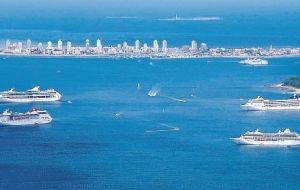MercoPress. South Atlantic News Agency
What happens if Chilean maritime costs force cruises to cancel the Pacific leg?
 Punta del Este on a busy summer day with several cruise vessels in the bay
Punta del Este on a busy summer day with several cruise vessels in the bay A Uruguayan cruise industry expert has brought up an interesting debate about the whole business for South America if Chilean port and auxiliary services costs remain so high that they end convincing some of the cruise companies to drop the traditional Pacific and Chilean leg of the tours.
According to Emilio Cazalá, a scary report from Chilean consulting engineers’ agencies is circulating in Santiago under the heading of “Opportunities and threats to the cruise industry in Chile”.
The report basically demystifies that port costs in Chile are “three and six times higher than in Argentina and Uruguay”: on the contrary Chilean ports are highly competitive “half the cost of Argentine ports”.
However what are expensive are maritime costs: lighthouses, pilots, tugs, signalling and other services, mainly because of the ragged Chilean geography and the fact cruise vessels need them to sail through the Chilean fiords.
The fact is that in 2008/2009, a total of 104.000 cruise tourists arrived in Valparaíso, but the following season the number dropped to 68.000 which is 35% less, and in other Chilean ports it was even worse.
Furthermore, according to Cazalá and based on Chilean data from the Southern Cone Ports’ Corporation, an Insignia type cruise vessel (181 metres, 685 pax) has to pay 42.254 US dollars in Valparaíso; Puerto Montt, 38.980 USD but in Ushuaia, 13.000 USD.
Apparently maritime costs in Chile are ruled by a law dating back to 1979, adjusted to US inflation, and which was meant to help pay for the sailing infrastructure along the coast of Southern Chile.
Additionally during the time the cruise vessels spend in Chilean waters they are banned from opening the casinos, which obviously cuts seriously into overall revenue.
Cazalá warns that if cruise companies decide to eliminate the Chilean leg of the South American tours, or reduce the number of calls, it could have an impact on the Atlantic coast.
“There shouldn’t be any problems for the 6/7 day cruises organized by Mediterranean Shipping Co, Costa Cruceros and Ibero-Crucerso, which leaving Rio do Janeiro then call in Punta del Este, Montevideo and finally Buenos Aires”, says Cazalá.
However for the 14/16 day cruises mainly for those fleeing from the northern hemisphere winter, there could be problems. They call at the River Plate, southern ports in Argentina, Ushuaia, some try the Falklands and Antarctica, but all return along the Chilean coast to Valparaíso, from where travellers fly back home.
In the Chilean port the cruise vessels receive new travellers, who will end their tour in Rio do Janeiro, 14/16 days later. This is roughly the timetable from December to March.
But if the Chilean leg is cut down because of the maritime costs, the cruise vessels profit equation could not be so interesting and returning along the same route up the Atlantic coast is not attractive, warns Cazalá.
“It’s hard to practice or imagine a turnover of cruise passengers in Antarctica, Ushuaia and the Falklands, which are limited by charter flights and costs”.
Although there’s not much that can be done from Montevideo, Cazalá proposes helping the Chilean cruise industry and Chilean ports by lobbying Chilean authorities about the significance of the cruise industry not only for Chile but for Mercosur members.
Teodoro Wigodsky, president of the Southern Cone Ports Corporation is hopeful “we can persuade authorities, the Ministry of Finance, to regulate in an issue that is so important for the Chilean tourism industry”.
Cazalá finally underlines that for Chileans and Uruguayans the cruise industry is a significant source of income and activity: the Atlantic leg is important for the Chileans and the Pacific leg is equally important for us on the Atlantic. Let us not forget the last season was also the last visit of the ‘Norwegian Sun’ because Norwegian Cruises will no longer operate in this part of the world”.





Top Comments
Disclaimer & comment rules-

-

-

Read all comments“Mr. Cazalá proposes helping the Chilean cruise industry and Chilean ports by lobbying Chilean authorities about the significance of the cruise industry not only for Chile but for Mercosur members.”
Aug 03rd, 2010 - 06:51 am 0Correct, but.... the article “forgets” to mention the “Malvinas OR Argentina” addendum in the above mentioned debate...
Quite an important detail for the future of the Islands Cruise Industry, I would say....
But then you would ... wouldn't you :-)
Aug 03rd, 2010 - 07:08 am 0The biggest effect this coming season will be the changes to the rules regarding heavy fuel oils ..... !
(2) Hoyt
Aug 03rd, 2010 - 07:36 am 0Correct.... Argentina voted heavy fuel out loooong ago!
Maybe Britain should found a new Cruise Company designed to visit the South Atlantic Islands.
They could name it: Desolate Cold and Solitary Windjammer Cruises Ltd.
Main attractions could include:
See the Malvinas wildlife: Penguins, Sea Lions and Elephant Seals starving to death in front of your eyes because of over fishing.
Or:
Go pub-crawling in Stanley... 1500 Inhabitants.. 15 fully licensed pubs.... plus the “secret”ones....
Or:
Watch millions of fat greedy British Rats devouring critically endangered day-old Petrel and Albatross chicks. Alive!
That would surely appeal to most of the folks in here ;-)
Commenting for this story is now closed.
If you have a Facebook account, become a fan and comment on our Facebook Page!